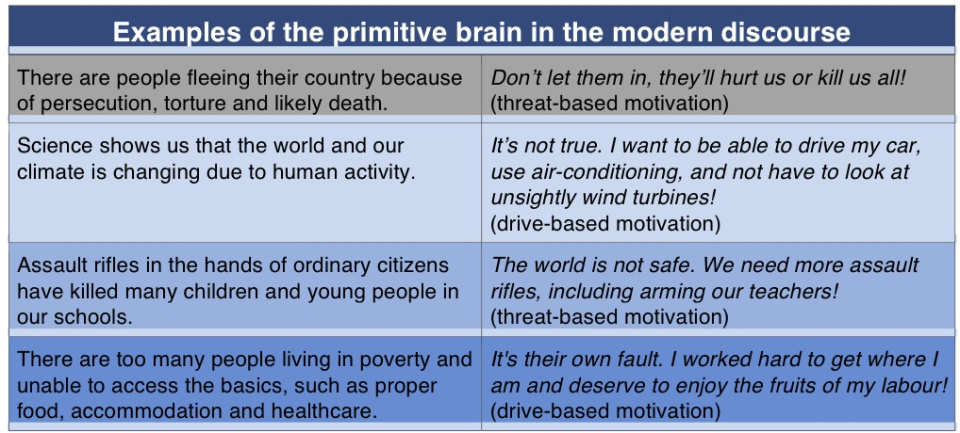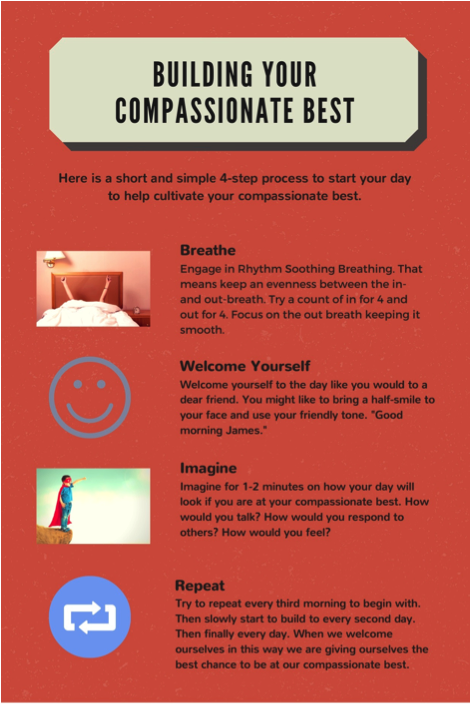By Dr Stan Steindl, Clinical Psychologist and Adjunct Associate Professor
A big chunk of the modern human brain functions in exactly the same way that it did thousands of years ago. Largely, this means our actions are still motivated by threat and drive systems. The evolutionary science and theories around the development of the human brain and these motivational systems are described in the work of Professor Paul Gilbert.
On the one hand, our threat system insists that it is “better to be safe than sorry”. In other words, our primitive brains much prefer to err on the side of mistakenly identifying a threat when it is not there, rather than miss the presence of a threat that is there. The result, of course, is heightened vigilance, anxiety and avoidance, and anger and aggression. Check out the great work on anxiety by Dr Dennis Tirch and anger by Dr Russell Kolts.
On the other hand, our drive system insists that we always “strive for something better”. This includes us seeking some of the fundamental resources necessary, such as food, shelter and sex. It also means wanting more, striving for success and dominance, as well as avoiding inferiority and shame, and generally focuses on gratification for ourselves and those close to us, potentially leading to selfishness or greed.
These threat and drive systems are extremely powerful motivators, even in modern humans. To our credit, there are many great examples of human progress. We have had the philosophy of the Ancient Greeks, the golden rule of religions, the age of enlightenment and development of human rights, the scientific revolution and the advent of democracy. But, despite all this, we still often feel, think and behave just like our ancestors from tens of thousands of years ago, those earliest Homo sapiens.

There are now well over 7 billion people in the world. The mere fact that this number keeps climbing proves one thing: human beings aren’t generally inclined towards killing other human beings! In fact, while cruelty and violence is certainly part of our make up, it is not all or even most of who we are. Human beings have a basic orientation towards affiliation.
Our ancestors survived because of their ability to look after one another, support one another, and comfort and soothe one another. This included, of course, our vulnerable young, but we looked after everyone, young and old, strong and infirm, all members of the tribe. And this worked really well. Those tribes of early humans that looked after one another and cooperated were able to thrive.
As aspects of the human mind, culture and sensibilities have continued to develop, human beings now have an exquisite opportunity to reflect on ourselves and how we operate in the world. Do we still want our behaviours to be dominated by the threat and drive systems? Do we want to allow those systems to create a world of divisiveness and enmity?
Or do we want to find a way to organise our threat and drive systems so that they can still helps us survive and get along in the world, without fear and greed pervading our species and motivating us to do terrible things to each other?
The soothing system is our chance to do that. Each and every one of us has this system as an integral part of our brains. And it is a source of great compassion. We just need to bring it front of mind and deliberately cultivate it in ourselves, expanding our ability to care for others beyond ourselves and our immediate family, friends or community.
By activating this soothing system, and cultivating compassion as the primary motivator to help organise our other systems and ourselves, we can:
- Become more aware of others throughout the world,
- Understand each of them as a whole person, and
- Begin to see them as just like us, and a part of the same common humanity.
People, ourselves included, are made up of many facets and need not be defined by the labels and biases we may presume of them. We can cultivate a compassionate attitude towards all the peoples of the world. Let’s face it, with progress, technology, communication, travel and the like, the world now is on the verge of being one tribe, living in one village. We are all in this global village together and we have the opportunity to start looking after one another.
By the way, it’s ok to get scared sometimes. Of course we can worry, say, about people we love being hurt, injured or killed and therefore act in ways to keep them safe. And it’s ok to be aspirational. Much of the good in the world has come from the ideas and efforts of human beings striving for something better. We just want to have that third piece of the puzzle, the soothing system, that organises threat and drive in a way that means others don’t need to suffer.
So, I invite you to stop for a moment and carefully think: What might it be like to take a compassionate attitude into your life? How might you start to think and feel? What might you start to do? Perhaps you might commit to doing something today?
Have a look at this info-graphic from my friend and colleague Dr James Kirby…a great way to start the day being your compassionate best.
 I will conclude by way of an example. In the context of current world events we might find ourselves thinking (or hear other people saying): This country’s going downhill! It’s unsafe. Those people are coming in here, taking our jobs. And most of them are criminals and murderers!
I will conclude by way of an example. In the context of current world events we might find ourselves thinking (or hear other people saying): This country’s going downhill! It’s unsafe. Those people are coming in here, taking our jobs. And most of them are criminals and murderers!
And then we might respond to ourselves from the perspective of the soothing system with: It’s ok. Thanks for the warning. It can be scary when things change. I’ll stay alert to the possible problems, but today I want compassion to be my guide. I want to see if there is something I can do to help.
For more information on Dr Steindl and the team of Clinical Psychologists at Psychology Consultants, visit www.psychologyconsultants.com.au
